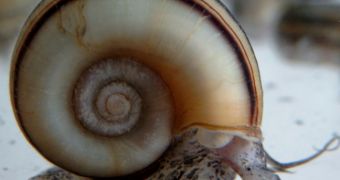Investigators have recently proved in a series of experiments that the evolution of shelled animals can be influenced by external factors that have little to do with natural selection.
The new work may reignite a decades-old scientific debate concerning the development and evolution of a wide class of shelled animals. The study is very interesting all by itself too.
In an experimental setup, the scientists who led this research wanted to simulate the evolution of snails into slugs, which are animals that do not carry a hard shell around on their backs.
Baby snails were exposed to the chemical element platinum, and the team says that this made them grow without developing an external shell, Wired reports.
One of the conclusions that can be drawn from this is that animal body plans can evolve on entirely new paths in giant leaps, that are not necessarily triggered by the necessity to adapt to the environment.
The study was conducted by German researchers at the University of Tübingen, who were led by expert Heinz Köhler.
Details of the study were published in the September-October issue of the esteemed scientific journal Evolution & Development.
For the research, Marisa snails were reared in small petri dishes, which contained varied concentrations of the metal platinum. About 80 percent of the initial snail population survived into adulthood.
Beyond a certain platinum concentration threshold, all of the snails grew without developing a shell. The German group came up with an explanation for this phenomenon.
Experts believe that platinum is affecting a genes that also mutated in the past, when slugs diverged from the snail group.
“This shows that you can get really dramatic changes that could be similar to the genetic mutations that drive evolution, without worrying about doing everything in small incremental steps,” comparative physiologist Roger Croll says.
“This is a very concrete demonstration, a very clear demonstration of a large-scale change in body plan. All of a sudden you get shell-less animals,” adds the expert, who is based at the Dalhousie University, in Halifax, Nova Scotia.
The study “demonstrates that development is modular, that you can have quite drastic modifications of the development of one component of the body plan but not others,” says biologist Louise Page, from the University of Victoria in British Columbia.

 14 DAY TRIAL //
14 DAY TRIAL //